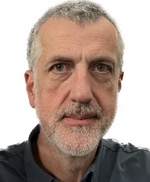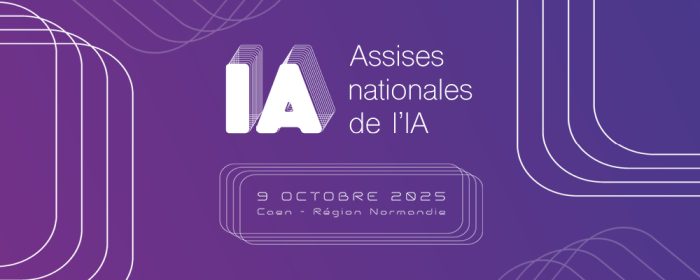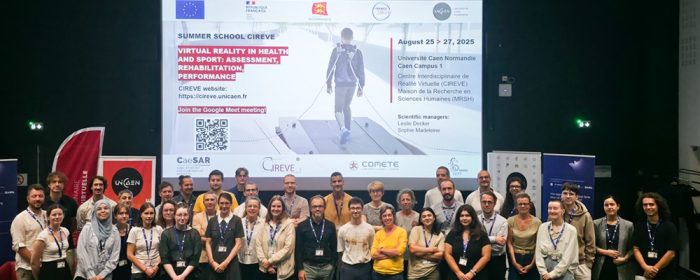
From June 29 to July 4, 2025, the university of Caen Normandie is organizing its 2nd Summer School on Artificial Intelligence (AI). Frédéric Jurie, the academic program manager, tells us more.
Can you tell us more about this Summer School and its main objective?
This Summer School, titled “Advancing Scientific Discovery with AI,” will take place from June 29 to July 4, 2025. Its primary goal is to create an interdisciplinary platform where researchers, students, and professionals from various scientific fields (medicine, physics, materials science, etc.) can explore AI applications in scientific research.
Over five days, participants will dive into cutting-edge AI techniques, collaborate on real-world scientific challenges, and engage with international experts. Each day will focus on a specific domain (e.g., medical imaging, particle physics), with a dual focus:
- Relevant AI methodologies (neural networks, generative models, etc.).
- Their impact on accelerating discoveries and solving complex problems.
The ambition is to showcase how AI can transform research by making simulations faster, diagnostics more accurate, and data analysis more efficient.
Why choose Artificial Intelligence for this Summer school?
AI is now an essential tool for science. It enables us to process massive datasets, model complex phenomena, and optimize costly experimental processes.
For example:
- In astronomy, generative models reduce simulation computation time.
- In medicine, convolutional neural networks improve radiological image analysis.
This year, we wanted to emphasize AI’s interdisciplinary nature: it is not just for computer scientists but is becoming a universal tool across all disciplines. By targeting real-world applications (e.g., sensor localization, material discovery), we demonstrate how AI integrates into scientific workflows, bringing tangible added value.
What are the main topics covered in the Summer School?
Each day is dedicated to a specific theme and AI methodology:
- Monday: AI for Medicine – Focus on medical image processing (convolutional neural networks).
- Tuesday: AI for Simulation Acceleration – Use of generative models in astronomy and high-performance computing.
- Wednesday: AI for Inverse Problems – Neural networks inspired by physics, particularly in magnetometry.
- Thursday: AI for Materials Science – Material discovery via Bayesian models and uncertainty quantification.
- Friday: AI for Particle Physics – Collision data analysis and anomaly detection with deep learning.
These topics highlight the diversity of AI applications while addressing common technical challenges, such as uncertainty management and integrating physical laws into AI models.
How will participants apply the skills they learn?
The focus is on hands-on experience. Each day includes practical sessions, where participants will work with real-world datasets (e.g., medical images, telescope data) and implement AI algorithms under expert guidance.
Examples of hands-on projects include:
- Training a neural network to detect anomalies in medical scans.
- Using generative models to speed up astrophysical simulations.
- Applying physics-informed neural networks to solve inverse problems.
These exercises will equip participants with practical skills that they can directly apply to their own research projects or professional fields.
What are the key benefits for students and professionals?
Participants will gain:
- Technical expertise – Mastering modern AI methods (deep learning, Bayesian models) adapted to their field.
- Interdisciplinary collaboration – Connecting with researchers in physics, medicine, computer science, fostering unique synergies.
- Professional networking – Engaging with renowned experts and international peers at the welcome reception and social event at Caen City Hall.
- Visibility – Opportunity to present their projects during discussion sessions.
- Immediate application – Acquired skills will help optimize research work, contribute to publications, and drive innovation in various industries.
What types of activities will be included?
The program balances theory, practice, and interaction:
- Lectures – In-depth presentations on key concepts (e.g., machine learning fundamentals).
- Workshops – Supervised labs to apply algorithms to real-world cases.
- Expert Talks – Insights from leading researchers in AI for healthcare and other fields.
- Discussion Sessions – Engaging debates led by scientific experts.
- Social Events – Welcome dinner and evening at Caen City Hall for networking.
- Breaks & informal exchanges – Coffee breaks and lunch sessions to foster connections.
Although there is no hackathon, workshops are designed to simulate real-world scientific challenges.
Who is this Summer School for?
This program is designed for:
- Students (Master’s, PhD) in science fields (physics, biology, engineering, etc.) wanting to integrate AI into their research.
- Researchers (postdocs, professors) looking to explore new interdisciplinary methodologies.
- Professionals (engineers, data scientists) working at the intersection of AI and scientific applications (e.g., healthcare, energy).
The selection process prioritizes diverse backgrounds and expertise levels to enhance knowledge exchange.
What message would you like to share with future participants?
To all science and AI enthusiasts: this Summer School is a unique opportunity to push the boundaries of your field. You’ll discover powerful tools, build long-lasting collaborations, and help shape the future of scientific research.
Whether you’re new to AI or already experienced, your perspective will enrich our community. Don’t hesitate to apply – we look forward to welcoming you for five days of learning, innovation, and inspiring exchanges!





